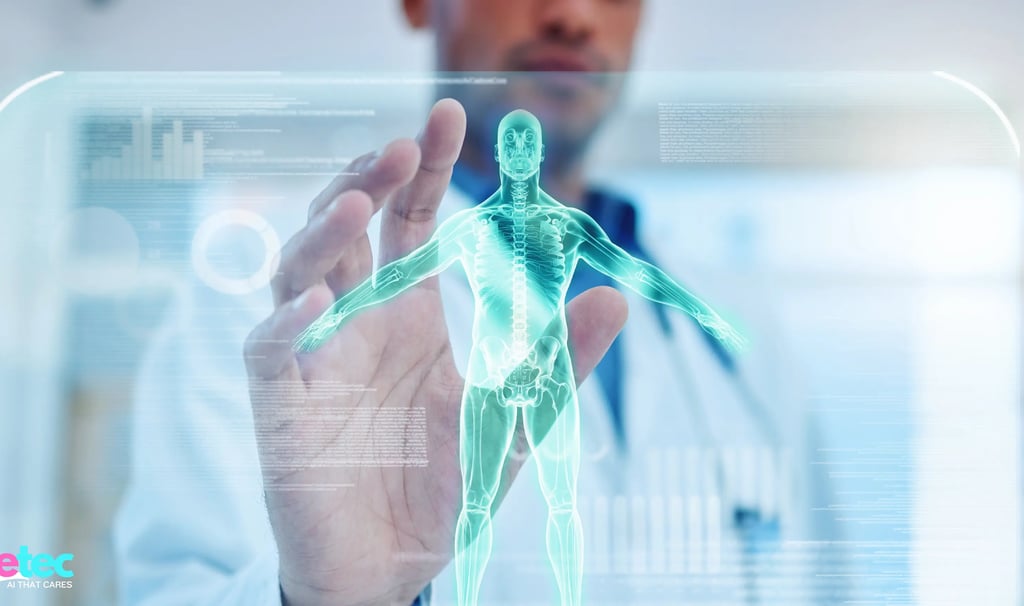The Importance of AI in Healthcare: Transforming the Way We Heal
In today’s fast-evolving world, artificial intelligence (AI) is no longer just a concept found in sci-fi movies—it’s actively reshaping industries across the globe, and healthcare is at the forefront of this transformation. From improving diagnostic accuracy to streamlining operations and personalizing patient care, AI is becoming an indispensable ally in modern medicine.
Lawrence Hobart
7/11/20252 min read


1. Enhancing Diagnostic Accuracy
One of the most significant contributions of AI in healthcare is its ability to analyze vast amounts of medical data quickly and accurately. AI-powered tools can detect patterns and anomalies in imaging scans, pathology slides, and even patient histories that might be missed by the human eye. For instance, AI algorithms are now helping radiologists detect cancers earlier and with greater accuracy, leading to more effective treatment outcomes.
2. Personalized Treatment Plans
No two patients are the same, and AI is helping healthcare providers tailor treatments to individual needs. By analyzing data from electronic health records, genetics, and lifestyle factors, AI can recommend personalized treatment plans that are more likely to be effective and reduce adverse reactions. This level of customization is a leap forward in delivering precision medicine.
3. Predictive Analytics and Preventive Care
AI is not just about treating illness—it’s about preventing it. With predictive analytics, AI can identify patients at risk of chronic conditions such as diabetes, heart disease, or stroke, sometimes before symptoms even appear. This enables early intervention, lifestyle adjustments, and proactive care, ultimately reducing hospital admissions and improving quality of life.
4. Efficiency and Administrative Relief
Healthcare systems around the world are burdened with administrative tasks, from appointment scheduling to documentation. AI-powered automation can handle routine processes, allowing clinicians to spend more time with patients rather than paperwork. This improved efficiency translates to reduced burnout among healthcare professionals and better patient experiences.
5. Supporting Rural and Underserved Communities
Telemedicine and AI tools are extending quality healthcare to remote and underserved areas. Virtual assistants powered by AI can guide patients through symptom checkers or help manage chronic conditions from afar. AI can also assist non-specialist health workers by providing decision support tools, reducing the gap in medical expertise between urban and rural settings.
6. Accelerating Research and Drug Discovery
AI is transforming the way new treatments are discovered. Machine learning models can analyze clinical trials, simulate drug interactions, and predict potential side effects, significantly reducing the time and cost required to bring new therapies to market. This has been especially evident during global health crises, like the COVID-19 pandemic, where AI played a key role in vaccine and treatment research.
Final Thoughts: AI as a Healthcare Partner, Not a Replacement
While AI is a powerful tool, it is not meant to replace human healthcare providers—it’s here to support them. By handling data-heavy tasks and offering insights, AI frees up clinicians to focus on what they do best: compassionate, person-centered care.
As we continue to unlock the full potential of AI, it’s essential that we also address ethical concerns, ensure data privacy, and maintain transparency. When implemented responsibly, AI can help create a smarter, more accessible, and more effective healthcare system for all.
Disclaimer: This article is for informational purposes only and should not be considered medical advice. Always consult with qualified healthcare professionals before making any health-related decisions or changes.
©2025 CareTec.AI
Melbourne: 101 Collins St Melbourne VIC 3000 +613 9999 7379
Sydney: 2 Chifley Square, Sydney NSW 2000 +612 8880 0307
Queensland: 46 Cavill Ave, Surfers Paradise QLD 4217 +617 3667 7473
Texas: 200 W 6th St, Austin, TX 78701 +1 (737) 7101 776
London: 22 Bishopsgate, London EC2N 4AJ +44 (020) 4577 4024


